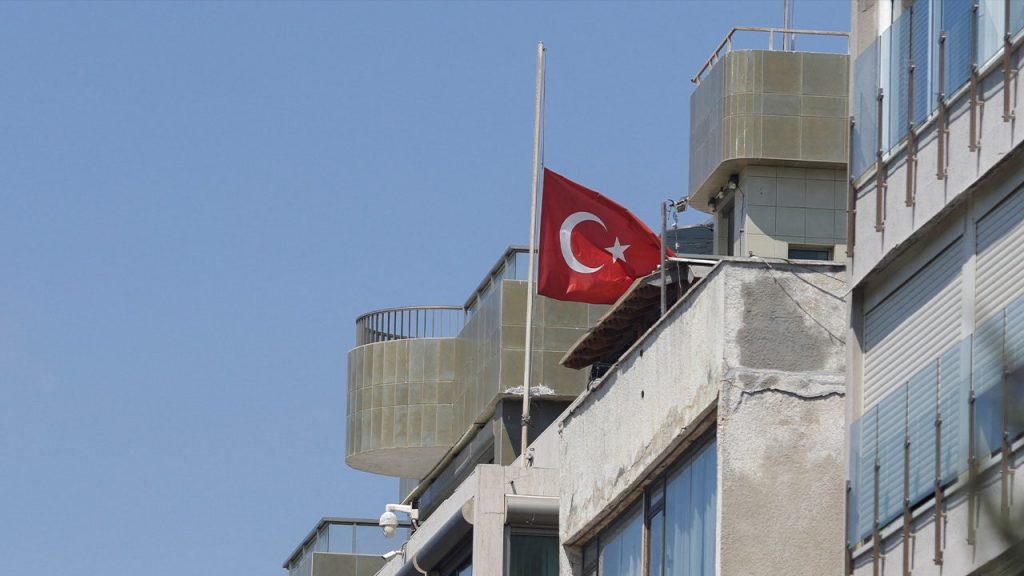Turkey’s President Recep Tayyip Erdoğan sparked outrage by ordering a day of mourning for the death of Hamas leader Ismail Haniyeh, and flags around the world, including in Israel, were lowered to half-mast. The Israeli foreign minister summoned the deputy Turkish ambassador for a severe reprimand after the Turkish embassy in Tel Aviv lowered its flag in honor of Haniyeh’s death. Foreign Minister Israel Katz criticized Erdoğan for supporting “Hamas’ murderers and rapists” and accused him of turning Turkey into a dictatorship. Turkish Foreign Ministry Spokesperson Oncu Keceli responded by stating that peace cannot be achieved by killing negotiators or threatening diplomats.
Pictures on social media showed that the Turkish flag was also lowered to half-mast in Washington, D.C., though these images could not be immediately verified. Erdoğan condemned the killing of the Hamas leader in Iran, where Haniyeh was killed in an attack involving a bomb planted in the visitor quarters where he was staying in Tehran. Questions have arisen over how a bomb could be planted in a building heavily monitored by Iran’s Islamic Revolutionary Guard Corps. Israel has not claimed responsibility for the killing of the Hamas leader but did claim a strike in Beirut that killed Hezbollah leader Fuad Shukr. Iran, Hamas, and Hezbollah have accused Israel of Haniyeh’s death and have vowed revenge.
The tensions between Israel and Turkey, as well as regional powers like Iran, Hamas, and Hezbollah, have escalated following the death of Hamas leader Ismail Haniyeh. Israel’s response to the lowering of flags in his honor has drawn criticism of Turkey’s support for terrorist organizations and accusations of turning into a dictatorship. The alleged involvement of Iran in the killing of Haniyeh has raised questions about security and surveillance in the region, as well as the potential for further retaliatory actions. The accusations and threats between the involved parties indicate a precarious situation that could lead to further conflict and instability in the Middle East.
The diplomatic fallout from Turkey’s mourning for the death of Hamas leader Ismail Haniyeh highlights the complex web of alliances and rivalries in the Middle East. Israel’s strong reaction to the lowering of flags in Haniyeh’s honor demonstrates its commitment to combating terrorism and holding those who support terrorist organizations accountable. The involvement of Iran, Hamas, and Hezbollah in the situation adds another layer of complexity, with accusations and threats intensifying tensions in the region. The ongoing ceasefire talks and the potential for further violence underscore the fragile nature of peace and stability in the Middle East.
The differing responses from various countries and organizations to the death of Hamas leader Ismail Haniyeh showcase the divergent perspectives and interests at play in the Middle East. Turkey’s decision to mourn Haniyeh’s death, along with Iran’s accusations against Israel, indicates a broader geopolitical struggle for influence and power in the region. The refusal of Israel to acknowledge responsibility for Haniyeh’s death, combined with its actions in Beirut, further complicates the situation and raises the stakes for all involved parties. The potential for further violence and retribution underscores the urgent need for diplomacy and de-escalation to prevent a wider conflict in the Middle East.
The controversy surrounding the mourning of Hamas leader Ismail Haniyeh and the subsequent tensions between Israel, Turkey, Iran, Hamas, and Hezbollah highlight the deep-rooted animosities and conflicts that define the Middle East. The accusations and threats exchanged between the parties involved reflect a long history of violence and mistrust, with each side seeking to protect its own interests and security. The complex geopolitical dynamics in the region, combined with the proliferation of terrorist organizations and state-sponsored violence, create a volatile and unstable environment where peace and stability remain elusive. The events surrounding Haniyeh’s death serve as a stark reminder of the challenges facing the Middle East and the urgent need for dialogue, cooperation, and diplomacy to prevent further bloodshed and suffering in the region.















